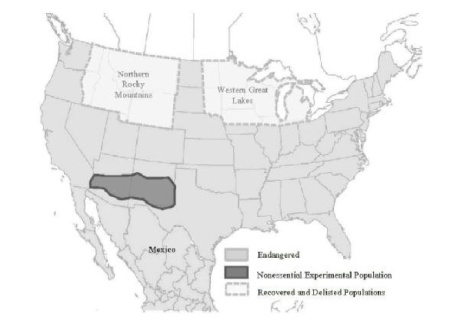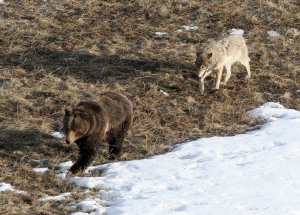Wolves may not be in danger of extinction, but are they recovered?

The current legal status of wolves in the U.S.

A gray wolf follows a grizzly bear in Yellowstone National Park. Photo courtesy NPS/Doug Smith.
By Bob Berwyn
FRISCO —An oft-discussed proposal to remove gray wolves from the Endangered Species List has progressed to the point that the U.S. Fish and Wildlife Servicehas developed a fairly detailed draft version of the plan. The draft rule proposes removing all protections for wolves in 29 eastern states but maintaining endangered status for the Mexican wolf by listing it as a subspecies.
“We propose these actions because the best available scientific and commercial information indicates that the currently listed entity is not a valid species under the Act and that the Mexican wolf (C. l. baileyi) is an endangered subspecies,” the agency wrote in the draft.
“[T]he listing is far more expansive than what we envision for gray wolf recovery, what is necessary for gray wolf recovery, and even what is possible for gray wolf recovery in the contiguous United States and Mexico,” the draft continues, saying that wolves “are not in danger of extinction now, and are not likely to become endangered within the foreseeable future, throughout all or a significant portion of their ranges.”
Wildlife conservation advocates are sure to challenge any proposal to de-list wolves. Some say the proposal is mainly political and based on faulty classification of wolves.
“This is not a slam-dunk issue,” said Defenders of Wildlife executive vice president Don Barry. “We think they’re tired of dealing with wolves. They just want to be done with wolves, and what’s really bad is they’re doing on the anniversary of Endangered Species Act,” said Barry, who worked for the U.S. Fish and Wildlife Service for many years.
Essentially, the federal plan would say that wolves are simply not threatened across their global range, and that therefore, they don’t need the protection of the Endangered Species Act in the U.S.
Barry said that position doesn’t mesh with intent of Congress when it passed the law to protect wildlife in the U.S.
“They’re saying there’s plenty of wolves in Canada and around the world. With that attitude, we never would have listed bald eagles, the grizzly bear … We don’t want to outsource the protection of endangered species. Congress wanted us to protect what he have here,” he said.
As the draft is written, it would de-list wolves in states like Colorado and Utah, key parts of the species’ former range with excellent suitable habitat where wolves have yet to return, as well and California, where a wandering wolf recently set foot in the state for the first time in more than 75 years.
With Endangered Species Act protection, states like Oregon and Washington could decide they don’t want any wolves at all. Utah, Colorado, and California and Northeastern states could decide never to pursue wolf restoration, foreclosing the possibility of recovery in large parts of gray wolves’ historic range.
“The Obama administration is giving up on gray wolf recovery before the job is done. How can they declare ‘Mission Accomplished’ when gray wolves still face significant threats throughout their range,” said Jamie Rappaport Clark, president and CEO of Defenders of Wildlife and a former Director of the U.S. Fish and Wildlife Service.
“Wolves in the Pacific Northwest have only just begun to recover, and there are no wolf populations in Utah and Colorado. Places like the Olympic peninsula in Washington state and the Colorado Rockies would benefit both ecologically and economically from the return of wolves. We shouldn’t be closing the door on an incredible opportunity to revitalize some of America’s best remaining suitable wolf habitat by bringing back these important iconic animals,” she said.
“Gray wolves once ranged in a continuous population from Canada all the way down to Mexico, and we shouldn’t give up on this vision until they are restored … But now, politics has been allowed to trump sound science, and the future recovery of America’s wolves is being tossed up in the air once again. It is truly sad that the Obama administration has chosen this path and short-circuited what could and should have been a tremendous conservation success for our nation,” she concluded.
